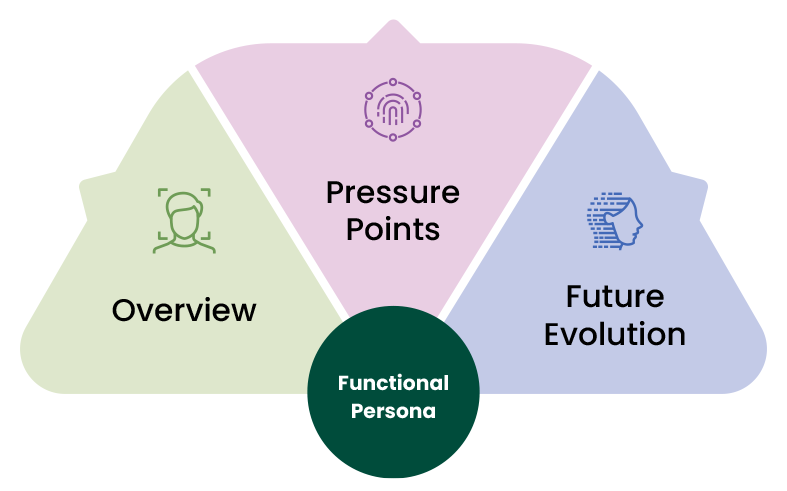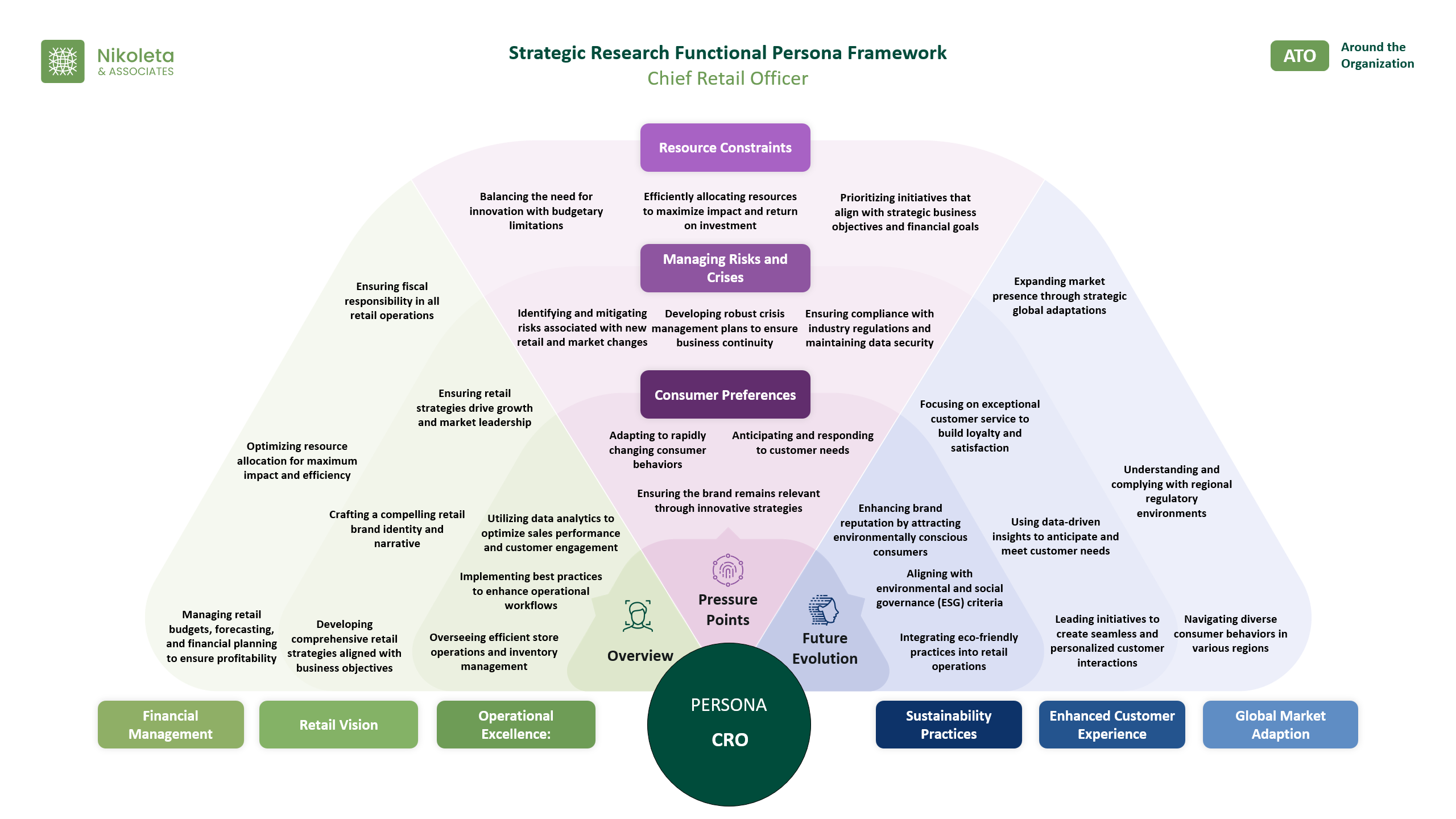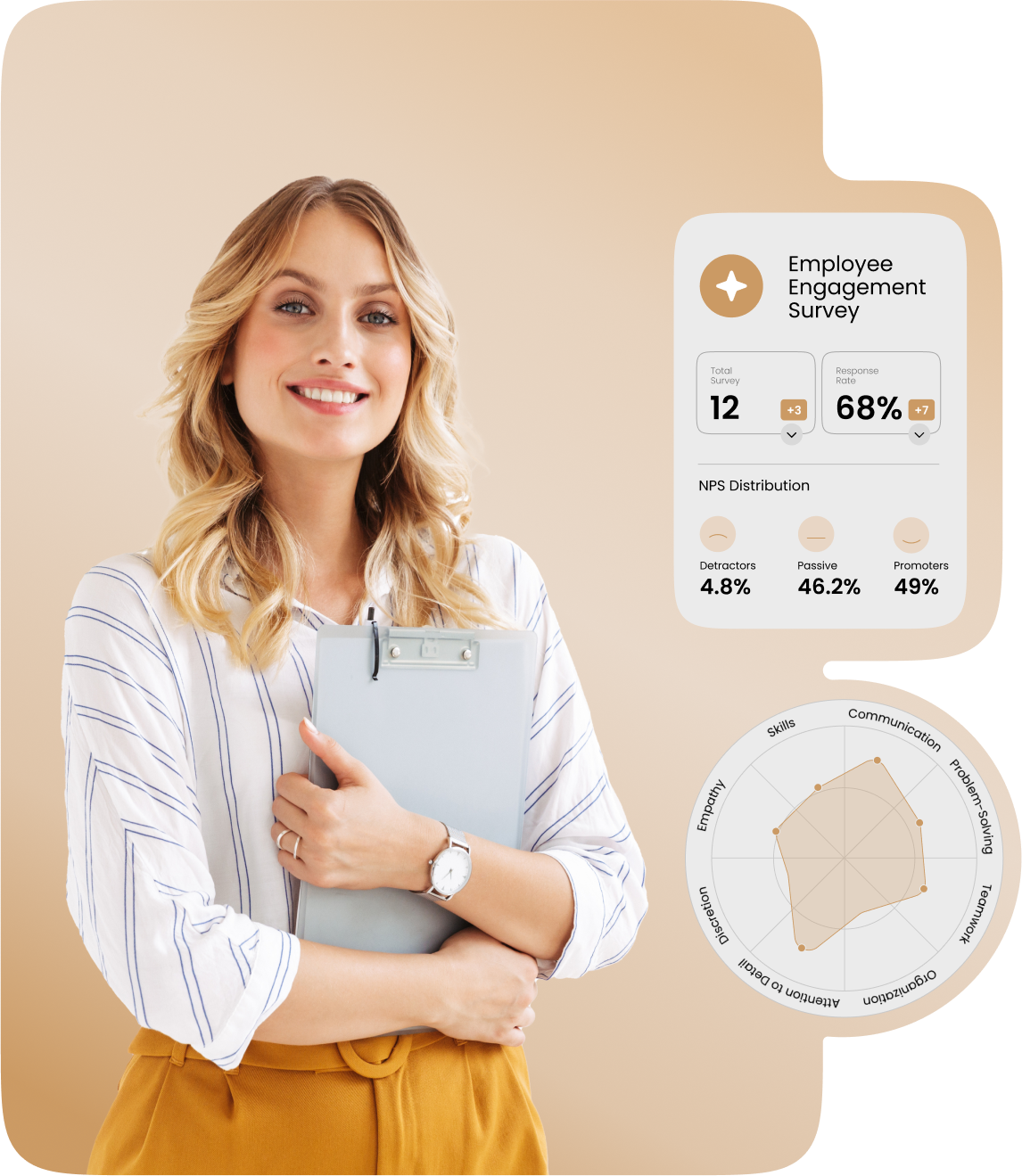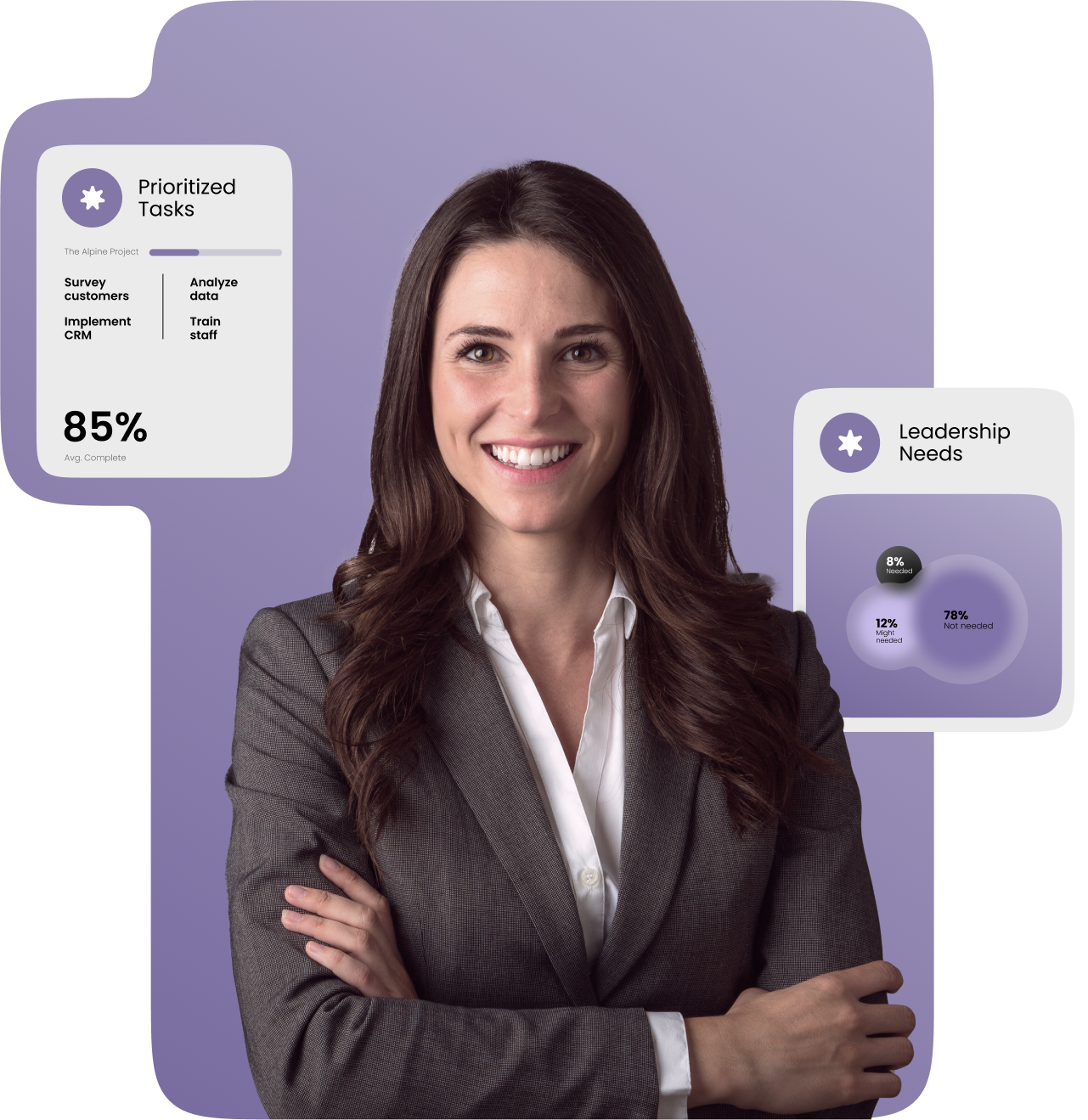Around the Organization (ATO)
Frameworks for Functional Role Clarity and Strategic Growth
Chief Retail Officer (CRO)
Persona Framework

Welcome to the Chief Retail Officer (CRO) segment of our Around the Organization (ATO) practice—an area in our Consulting and Capability function dedicated to exploring and capturing the essence of modern organizational roles. Dive into the unique characteristics, challenges, and future evolution of the CRO role.
Learn how CROs drive retail strategy, optimize store operations, and enhance the customer experience. Discover the critical role CROs play in managing inventory, staffing, and merchandising to achieve sales and profitability goals.
The Framework

The overview takes a deeper dive into the functional persona by integrating a holistic perspective. This section highlights the unique characteristics, capabilities, and the central role that the functional persona plays within the organizational ecosystem.
The pressure points highlights the challenges and obstacles that individuals within the functional persona may encounter. The importance of the pressure points is aimed to provide guidance towards the overall wellbeing of the functional persona.
The future evolution considers the ever-evolving landscape of market trends and how they intersect with the trajectory of the functional persona. It does not only forecast, but also aims to prepare and shape the functional persona to the change.
Overview
The Chief Retail Officer (CRO) is responsible for guiding retail strategies and overseeing operations, aiming to drive growth by implementing innovative practices and maintaining a customer-centric focus.
The CRO is tasked with crafting and implementing retail strategies that align seamlessly with the company’s overarching business objectives. This role requires a deep understanding of market trends, consumer behaviors, and competitive dynamics to effectively drive growth and enhance the customer experience. The CRO leads cross-functional teams, ensuring that retail operations are integrated and cohesive across all channels. Responsibilities encompass overseeing store operations, managing inventory and budgets, optimizing sales performance, and driving customer engagement initiatives. Leveraging data analytics is crucial for the CRO to measure performance and continuously refine strategies. Additionally, the CRO fosters an innovative culture within the retail team, encouraging creative solutions to challenges. Strong leadership is vital for inspiring and guiding the retail department towards ambitious goals, ensuring alignment with broader organizational aims.
Role Attributes
Team Leadership: Cultivating a motivated and high-performing retail team through effective leadership and development programs
Financial Savvy: Managing budgets, forecasting, and financial planning to ensure profitability and fiscal responsibility in retail operations
Strategic Partnerships: Building and nurturing strategic partnerships with suppliers, vendors, and other stakeholders to enhance retail offerings
Crisis Management: Effectively managing and navigating through retail crises and challenges to maintain business continuity
Pressure Points
The CRO faces challenges in managing market dynamics, resource constraints, and aligning retail and operational initiatives with overall business strategies.
Navigating the fast-paced retail landscape, the CRO must stay ahead of market trends and evolving consumer preferences. Continuous market research and agility in strategy adjustments are essential to remain competitive. Balancing innovation with practical budgetary constraints presents a constant challenge. Collaboration with other executives ensures that retail initiatives enhance broader business strategies. Integrating digital transformation within retail operations is crucial, employing advanced technologies and data analytics for optimal results. Justifying retail expenditures and demonstrating return on investment requires clear, persuasive communication of retail’s value. Additionally, the CRO must manage risks associated with new ventures, ensuring they align with the company’s strategic objectives. Addressing these pressures demands resilience, strategic foresight, and effective stakeholder management.
Common Pressure Points
Managing seasonal fluctuations in retail demand
Ensuring consistency in brand messaging across all channels
Maintaining data privacy and cybersecurity in retail operations
Responding to competitive pricing pressures and market saturation
Future Evolution
The CRO role is expanding to include a stronger emphasis on sustainability, employee engagement, and global market adaptation, in addition to technological advancements.
As the retail landscape evolves, the CRO’s role will increasingly focus on sustainability, ensuring that retail operations align with environmental and social governance (ESG) criteria. Emphasizing sustainable practices will not only enhance brand reputation but also attract environmentally conscious consumers. Employee engagement and development will become more critical, with the CRO fostering a supportive and inclusive culture that promotes continuous learning and growth. This focus will enhance team performance and drive innovation. The CRO will also need to adeptly navigate global market adaptations, understanding and responding to diverse consumer behaviors and regulatory environments in different regions. Building strategic partnerships with local and international stakeholders will be essential for expanding market presence. Furthermore, enhancing customer experience will remain a top priority, with the CRO leading initiatives to create seamless and personalized interactions across all touchpoints. Adaptability to rapid market changes and global disruptions will be vital, requiring the CRO to implement flexible strategies that ensure resilience and sustained growth.
Role Evolution Aspects
Sustainability focus through eco-friendly practices and ESG alignment
Employee engagement with supportive, inclusive culture and continuous learning
Global market adaptation to diverse behaviors and regional regulations
Strategic partnerships with strong local and international relationships
The Role of Change in the
CRO Functional Persona
The Chief Retail Officer (CRO) plays a pivotal role in driving the organization’s retail transformation, adeptly managing the challenges posed by shifting consumer behaviors and market dynamics. This position requires a strategic outlook to anticipate industry trends and position the company to seize new opportunities. CROs must skillfully balance immediate retail initiatives with long-term objectives, ensuring that all efforts are in harmony with the broader corporate strategy while fostering teamwork with other executive leaders.
For CROs, embracing retail change is crucial for enhancing the organization’s customer experience, boosting operational efficiency, and maintaining a competitive advantage in a rapidly evolving market landscape.
How CROs Can Be Open to and Maintain Change
Adopt Agile Practices
Implement agile methodologies to quickly adapt to market changes and consumer demands
Integrate Omnichannel Strategies
Seamlessly blend online and offline retail experiences to meet diverse customer preferences
Prioritize Customer Experience
Focus on delivering exceptional customer service and personalized experiences to build loyalty and drive sales





















